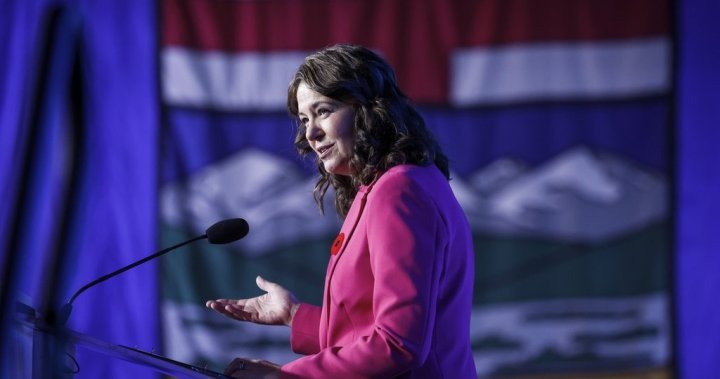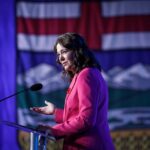The steady drizzle outside the Telus Convention Centre last night did little to dampen the fiery mood inside as Premier Danielle Smith addressed a packed room of business leaders and political supporters. What began as a standard economic policy speech quickly pivoted toward what many Calgarians recognize as an increasingly vocal undercurrent in provincial politics – Alberta separatist sentiment.
“I understand the frustration. Believe me, I do,” Smith told the crowd, her voice carrying a measured tone that’s become characteristic of her public appearances on this delicate subject. “But our strength lies in fighting for a better deal within Confederation, not outside of it.”
The Premier’s comments come amid polling from the Canada West Foundation suggesting nearly 30% of Albertans now express some openness to independence – a significant jump from 19% just five years ago. This shift has been particularly pronounced in rural areas and among younger voters under 40.
I’ve covered Alberta politics for over a decade, and what’s striking about the current landscape isn’t merely the numbers, but the changing face of sovereignty sentiment. This isn’t your grandfather’s separatist movement.
“The profile has shifted dramatically,” explains Dr. Lisa Young, political scientist at the University of Calgary. “Today’s sovereignty advocates include tech entrepreneurs, energy professionals, and young families – people who feel economically disadvantaged by federal policies they see as dismissive of Western interests.”
Last night’s crowd reflected this evolution. The room wasn’t filled with fringe political figures but mainstream business owners, professionals, and community leaders – many expressing what they call “practical concerns” rather than ideological positions.
Tom Richards, who runs a medium-sized manufacturing company in the city’s southeast, told me after the event: “I employ 47 people. Every federal policy decision hits our bottom line. It’s not about waving flags or rhetoric – it’s about survival.”
The Premier walked a careful line, acknowledging frustrations while simultaneously attempting to channel them toward her government’s “Alberta First” approach – a strategy that stops short of separation while asserting provincial autonomy across multiple fronts.
Smith specifically highlighted her government’s recent moves on pension reform, provincial policing initiatives, and taxation powers as examples of “practical sovereignty” – a term that’s gained traction in political circles here over the past year.
But not everyone was buying it. Outside the venue, a small but vocal group of protesters held signs with slogans like “Alberta Nation Now” and “Sovereignty Not Symbolism.” Their presence highlights the pressure Smith faces from her political right flank.
The economic context driving these sentiments can’t be ignored. Calgary’s unemployment rate, while improved from pandemic lows, still sits at 6.8% according to the latest Statistics Canada data – notably higher than the national average. The energy sector, despite recent rebounds, remains vulnerable to federal environmental policies that many here view as existential threats.
Dr. Young notes this economic anxiety creates fertile ground for sovereignty discussions: “When people feel financially insecure, political alternatives that might have seemed extreme can suddenly appear reasonable.”
Smith’s messaging strategy appears calculated to acknowledge these feelings without fully embracing separation – a balancing act that political analysts suggest is designed to keep her coalition together ahead of the next provincial election.
“The Premier knows that open advocacy for separation would alienate moderate voters,” explains political strategist Janet Brown. “But dismissing these sentiments entirely would cost her support from her base. She’s trying to occupy the middle ground.”
For everyday Calgarians, the debate often feels more practical than philosophical. At Ricky’s Diner on Macleod Trail this morning, I overheard a conversation between two oil and gas workers that captured the mood.
“I don’t care what flag flies over the legislature,” said one. “I just want policies that let us compete fairly and keep more of what we earn.”
His companion nodded in agreement. “If they can fix that within Canada, great. If not…”
The unfinished thought hangs in the air across much of the province these days.
Smith closed her remarks last night with what seemed like a warning to Ottawa: “The time for platitudes and empty promises has passed. Albertans demand respect, fairness, and autonomy. One way or another, we’ll secure it.”
As I left the convention center, the rain had stopped, but the atmosphere remained charged. Whatever one thinks about separatism’s viability, it’s clear the sentiment itself has become a powerful political current in Alberta – one that Smith and her government must continue navigating with precision.
Whether this represents a genuine sovereignty movement or simply a bargaining position remains to be seen. But one thing is certain – the conversation isn’t going away anytime soon.







